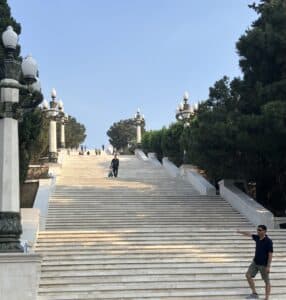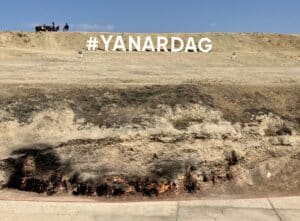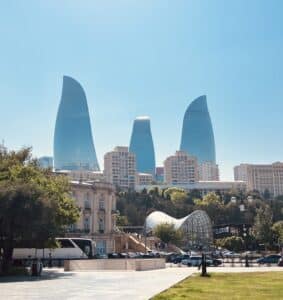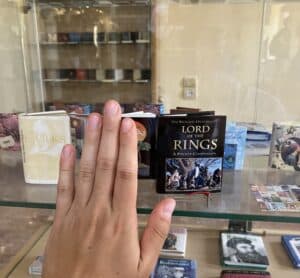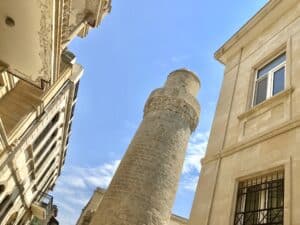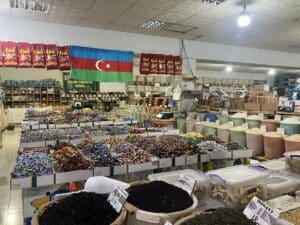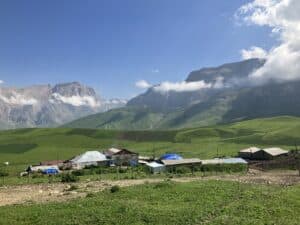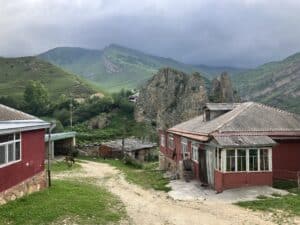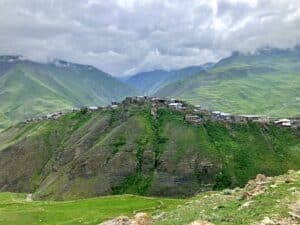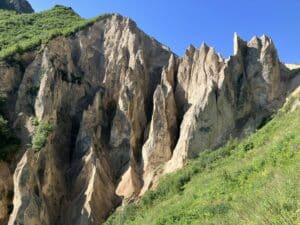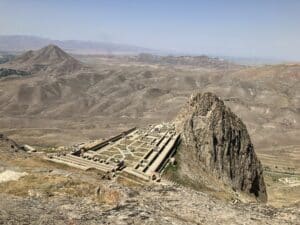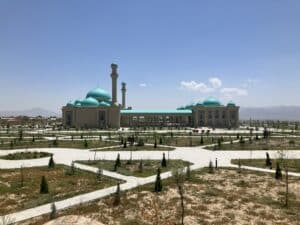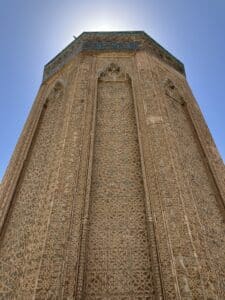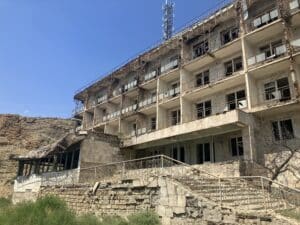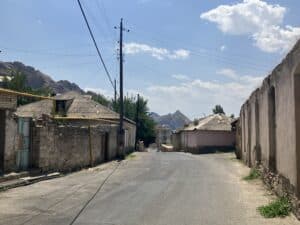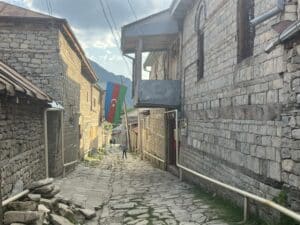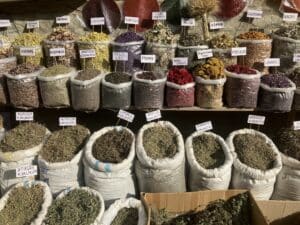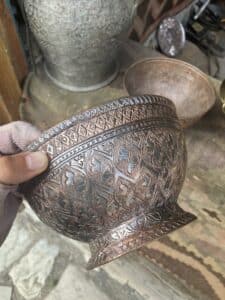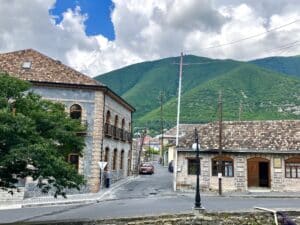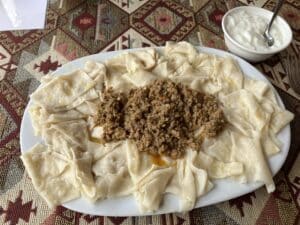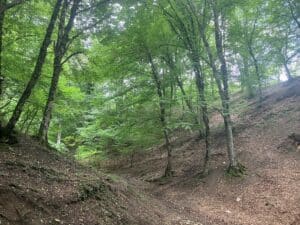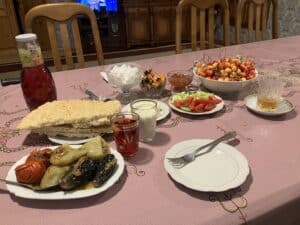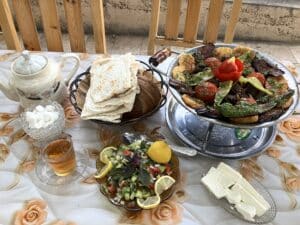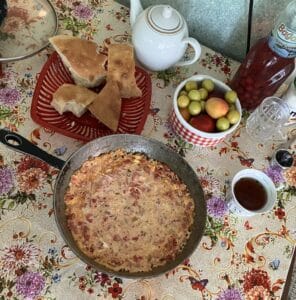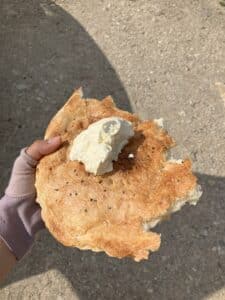Over the summer of 2023, I spent three months solo backpacking across the Caucasus. I spent my first month in the Republic of Azerbaijan. Below I’ll break down my time in this country by its incredible regions. If you are interested in the other parts of my trip, you can check out my intro page or my articles specifically on Armenia and Georgia.
In all of these, one of my primary purposes was to hike the majestic Caucuses – so you’ll notice in all of these, that I spend a lot of time moving around on foot. I also give advice on how to explore the villages and cities via transport.
I strongly recommend that you take a look at my intro page, where I share some details on how I planned this trip and about the importance of doing your own research, so that you can stay safe and learn the most from the country you are about to go to!
Baku
Baku is the capital of Azerbaijan and definitely the most urban part of the country. It presents a beautiful juxtaposition of centuries of history plainly visible alongside modern buildings and life.
The most iconic site of Baku is the Flame Towers. These three metal-and-glass skyscrapers get their name due to their resemblance to flames. They were built as symbols of the country, which is so rich in natural gas and oil that the land itself in certain places can sometimes catch fire. The “Azer” in the country’s name actually means “fire.”
Excellent views of the towers, and the rest of the city with its Caspian coastline, can be found at Highland Park, above the city. This large square is reached by a massive staircase. During the day you can see the sea glistening while at night the entire city lights up.
Old Town/Old City Baku is another wonderful spot. The Old Town Maiden Tower, a 12th century monument and a UNESCO World Heritage site, is one of the most interesting landmarks in this area. No one knows its exact origins, as the foundation is much older than the upper structure and archeological evidence shows that its purpose has likely changed over time. Most famously, it is connected to stories of maidens who rose out of fire to save the city in times of crisis.
I recommend taking the Old Town and Oil Heritage free walking tour which includes the Old City, Maidan Tower, Flame Towers, Museum of Miniature Books, and Yasil Market. The guide was super nice, and within two hours you will become familiar with the historic part of Baku.
Guba & Gusar
The Guba and Gusar regions are located in northern Azerbaijan and are home to several mountain villages. I spent my time here doing a 3-day trek from Khinaliq to Laza, looping through Yergi kek at the end (total 66 km). Information and GPS tracks for the trail can be found on the Transcaucasian Trail website. (The trail is currently being developed in Azerbaijan, therefore much of it is still unmarked.)
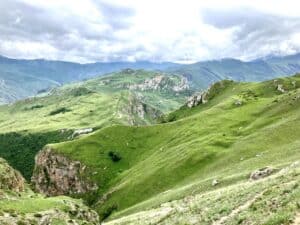
The mountains of Azerbaijan were beyond anything I ever could have expected. They were so green, greener than any mountain range I had seen before. And not a muddled dark forest green but rather a never-ending bright green of rolling mountain tops combined with rocky cliff faces. The scenery was breathtaking. Even if you do not embark on a multi-day trek, the villages of Khinaliq and Laza are easily accessible by taxi from the larger city of Guba. You can opt to stay in a guesthouse in Khinaliq and/or Laza and admire the gorgeous scenery on day hikes around the respective village if that suits your travel style more.
The villagers in the Guba and Gusar regions were some of the kindest and most welcoming I met on my entire trip. I showed them my itinerary, and they recommended people to stay with in the various locations. These stays offered delicious home-cooked dinners and breakfasts. One of the men whose family I stayed with in the village of Griz was a transcaucasian hiker and mountaineer guide, so he had many tips for my route, including how to handle encounters with aggressive shepherd dogs. This proved very useful the next day because I was almost attacked by some dogs in the middle of nowhere. A babushka also gave me a pair of hand-knit slippers which I still wear on a daily basis. If that wasn’t enough to make this experience warm my heart, I also ran into the directors of the Transcaucasian Trail Project themselves! It was completely random, just as I was exiting the Shahdag ski resort area to approach Laza, and they were, the only other non-locals I encountered on the three-day trek.
On my third day of trekking, I was planning to go from Laza to Yergi kek, one of the highest inhabited settlements in Azerbaijan. I encountered two local guys about a third of the way on my trail, and they offered me to horseback ride with them. We had about five words in common in Russian, and there was no internet signal, so we could not use an online translator. Yet, it proved to be one of the sweetest experiences and proof that language is not a barrier. We rode up to Yergi kek and then completed a loop back down to Laza. In Laza, we finished the day over some kebab and beer.
My favorite part about this trail was how untouched it felt. In some parts (for example, most of the second day), there was no trail at all, and I was the only person there, merely following my offline GPS route. It was just expansive mountain wilderness. I passed by a couple shepherds, their herds of sheep, some cows, and the shepherd dogs I did my best to avoid – those were the only signs of life I saw outside the villages. It felt like I had the entire mountain range to myself; it was so raw and unspoiled. The mountains of Guba and Gusar are definitely ones that I will return to.
Nakhchivan
The Autonomous Republic of Nakhchivan is an exclave of Azerbaijan, meaning that despite being a part of the country, it is not connected to the mainland. Instead, it is bordered by Iran, Armenia, and Turkey. Nakhchivan feels very different from mainland Azerbaijan; it is desert in every direction, and the mountains are a dry brown. There is a certain charm to it given that the republic is over 3500 years old. The exclave is known for its historical monuments, such as Momine Khatun Mausoleum, Ashabi-Kahf Cave, and Alinja Castle (nicknamed Azerbaijan’s “mini Machu Picchu”).
Qala Restaurant in Nakhchivan City is highly recommended. I had read good reviews about it online, and although I tend to generally avoid restaurants when I travel, I decided to give this place a try. I couldn’t read the menu because they only had it in Azerbaijani, so I just asked for something traditional. The staff was very kind and served me an entire traditional meal consisting of sizzling hot meat, vegetables, potatoes, bread, and tea for just $12.
While in Nakhchivan I also did a day trip to Ordubad, the second largest city in the exclave. This was the moment I realized that a traveler should always go to at least one other city in addition to the capital. Ordubad is possibly the most rural-feeling city I have ever been to. It looked extremely old, many of the buildings were falling apart, and there weren’t many people – in other words, it did not “feel” like the second largest city in Nakhchivan by what I had imagined. I don’t say this in a demeaning way at all; my visit to Ordubad was exciting and helped solidify the fact that often non-capital cities are extremely different from their capital counterparts because of resource allocation and development.
Personally, I would recommend traveling to the Nakhchivan Region with another person if you are on a budget. The region itself is quite cheap, but you need a taxi to get to most of the landmarks since they are outside the cities. If you are a solo traveler and do not have someone to split fares with, taxi costs will quickly add up. There are buses that go to some of the landmarks, but there is no online information on the bus schedule, so you will have to go to the station in advance if you want to pursue this option. The more isolated sites, such as Alinja Castle, cannot be reached by bus. I was also not able to find a cheap hostel due to the lack of virtually any tourist infrastructure, so this was one of those very rare occasions where I stayed in a hotel. Despite the fact that Nakhchivan feels isolated, it is very safe much like mainland Azerbaijan, and I never felt that as a solo female my safety was at risk.
Ismailli
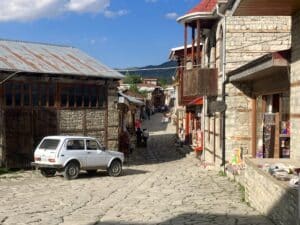
The Ismaili District is in north central Azerbaijan, back on the mainland. The main place to explore here is Lahic, a small, sweet village with picturesque cobblestone streets. Lahic was an important stop for merchants on the Silk Road. Today, it has transformed into a more touristy location and is a perfect spot for a day or weekend trip. The streets have dozens of shops with local sweets and spices, hand-made crafts, metalworking artisentry, and wood and ceramic products. If you go deeper into the village, past the tourist shops, you can see the real village – the little farms, children playing by the river, horses, and quiet roads. This combination makes it a wonderful place to explore Azerbaijani village life without feeling too isolated.
Qaranohur is another popular location in Ismailli. The lake, located at an altitude of 1540 m (nearly a mile) above sea level in the village of Talistan, is known for being among the most beautiful in Azerbaijan. The surrounding forests offer multiple opportunities for both easy-going day strolls and more difficult hiking routes.
Sheki
Sheki, further east in northern Azerbaijan, is the name shared by a region and its capital city. Its capital city, which shares that name of the wider district, will always hold a special place in my heart. It is located in a circle of mountains with the city in the middle. Whichever way you look, you see all the houses and lush forests rising above you. You can spend so much time simply wandering through the streets as the city is fairly large.
Sheki is known for its hospitality and its sweets. The people are extremely kind and warm. One of the babushkas at the fruit market always smiled when I stopped by, as if she was waiting for me. I also became friends with a guy from Sheki at my hostel in Baku who was kind enough to show me around town and introduce me to his friends. He also taught me enough Azerbaijani to be able to shop in the market without needing Russian. He and the seller were so happy after I purchased everything using only Azerbaijani (even if my sentences were quite broken). Memories such as these are the ones I hold on to because they serve as a reminder of how much the simplest things in life – these everyday human interactions – bring joy to a person.
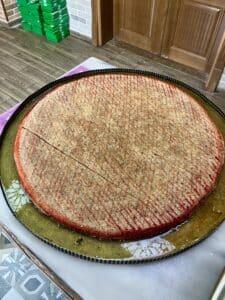
I highly recommend a visit to Sheki’s main sweets house, Aliovsat Sweets House, where they prepare in-house a wide range of pahlava, cookies, and other traditional sweets. You don’t even need to buy anything; they will offer you many free samples! I tried a walnut pahlava which was absolutely macerated in honey, and it was delicious. Some fun facts that make Sheki pahlava unique – the rice flour must be ground in a water mill, and the top nutty layer (called the rishta) has a grid-shaped pattern made from syrup.
Sheki Hostel is also a wonderful and quiet spot. This option isn’t found on online sites such as Booking.com, but it is cute and located by the river near the city center. The hostel has an affordable restaurant on the second floor with beautiful wooden floors and ceilings that serves traditional Sheki dishes, such as yarpag khengeli (flat pasta pieces topped with ground meat and yogurt). The owners are an elderly couple who recently renovated the entire place themselves. It was a pleasure to meet and talk with them.
Sheki is another great spot for hiking because it is surrounded by mountains! The main one to do is from Sheki to the Zagatala district, a trek which covers 97 km. I was originally planning to complete this trail, but I ended up busy in Sheki helping some locals (part of travel is spontaneity) that I didn’t cover as much hiking as I would have liked. The directors of the Transcaucasian Trail Project told me that this was one of their favorite treks, so hopefully I can return to complete it!
What I Ate
Some other traditional dishes, besides those mentioned above, that I recommend you try, include dolma (stuffed grape leaves), gutab (thin vegetable and meat pies), and dushbara soup (mini dumpling soup). My friend from Sheki taught me how to make pomidor-yumurta, a tomato-egg dish vaguely akin to shakshuka. Otherwise, my day-to-day meals consisted of foods I bought at the grocery store and ate on my hikes (bread, cheese, salami, and dates) or prepared at the hostel (yogurt, oats, sausages, ramen, and stewed eggplant with sausage).
Spending
Here is the breakdown of my costs across four weeks in Azerbaijan. As a reminder, I would categorize myself as a frugal traveler, meaning that I often stay in cheap hostels, eat the same street or grocery store food for days on end if necessary, and occasionally hitchhike.
- Accommodation: $210
- Food: $190
- Transport: $70
- Roundtrip airfare to Nakhchivan: $80
- Miscellaneous: $50
- Total: $600
You’ll Also Love
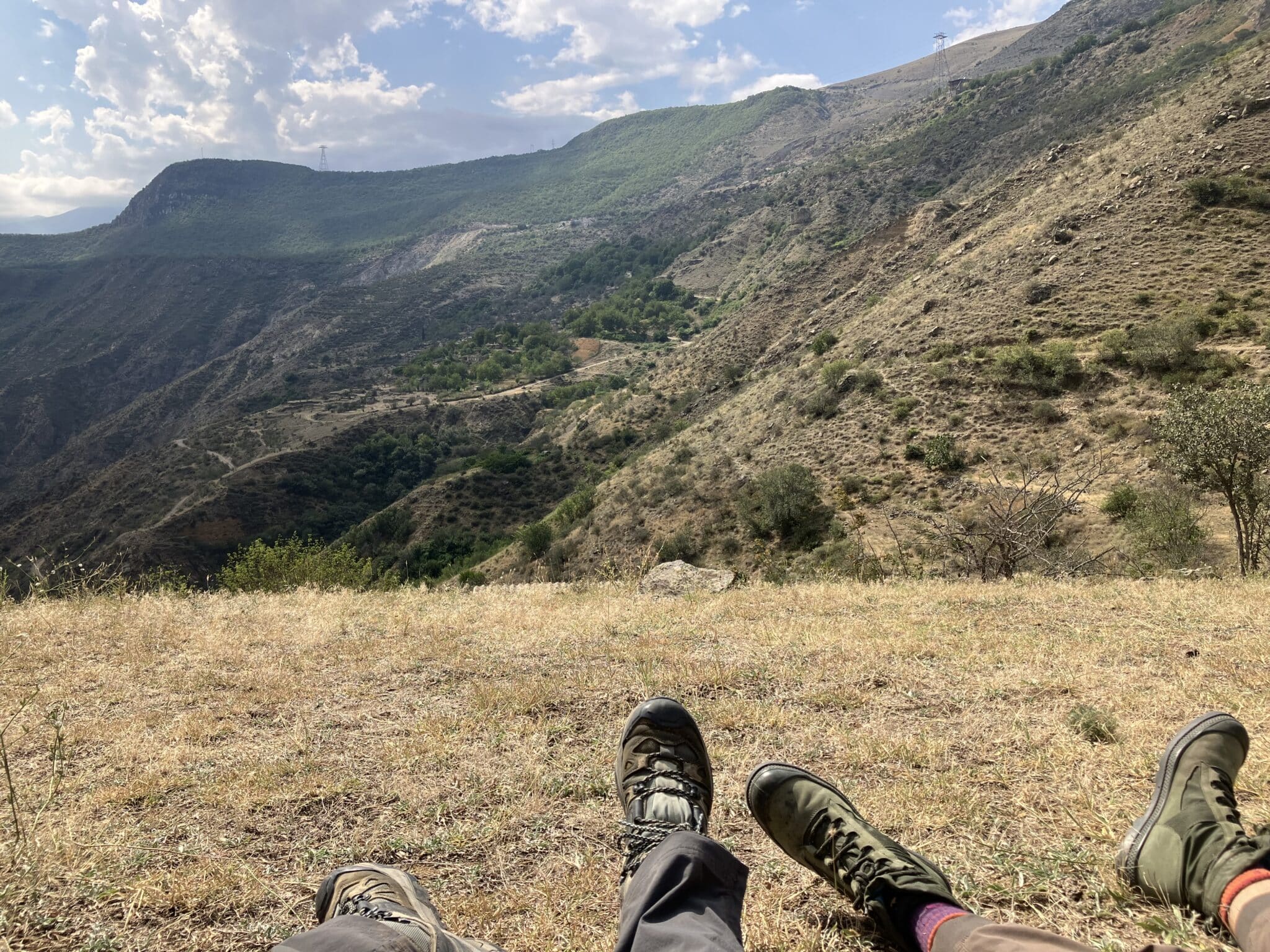
Hiking the Caucasus
Summer of 2023 – a summer I spent as a solo female budget backpacker traversing across the three Caucasus republics of Azerbaijan, Georgia, and Armenia. My trip focused on hiking and meeting locals in these three very different countries. It was arguably the most ambitious and most rewarding undertaking of my life so far, and […]
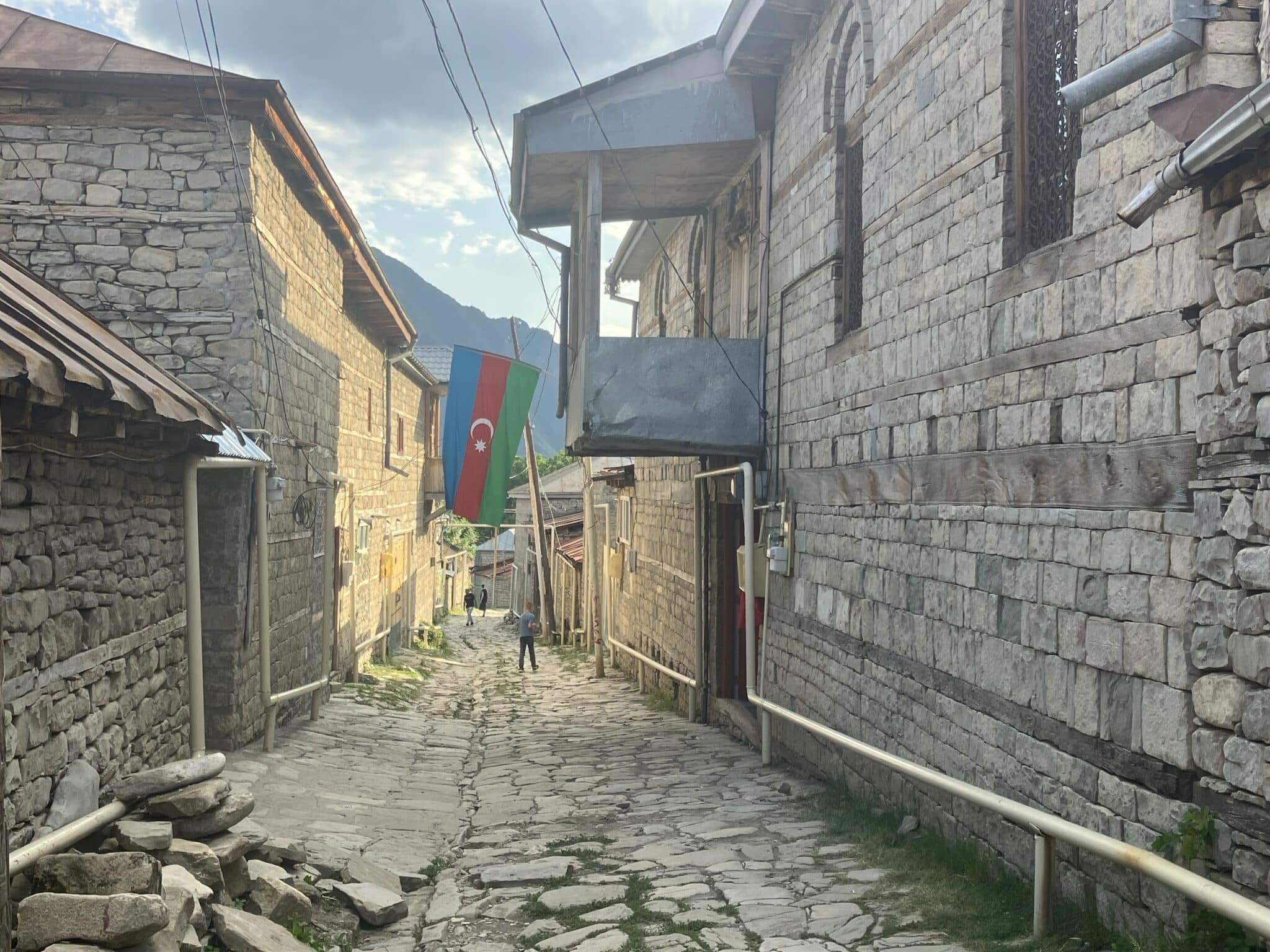
Hiking in Azerbaijan
Over the summer of 2023, I spent three months solo backpacking across the Caucasus. I spent my first month in the Republic of Azerbaijan. Below I’ll break down my time in this country by its incredible regions. If you are interested in the other parts of my trip, you can check out my intro page […]

